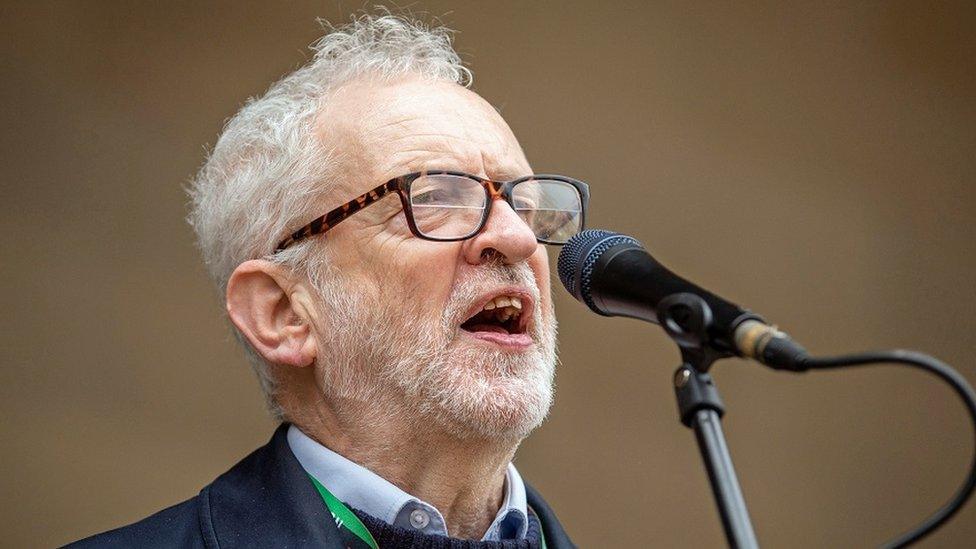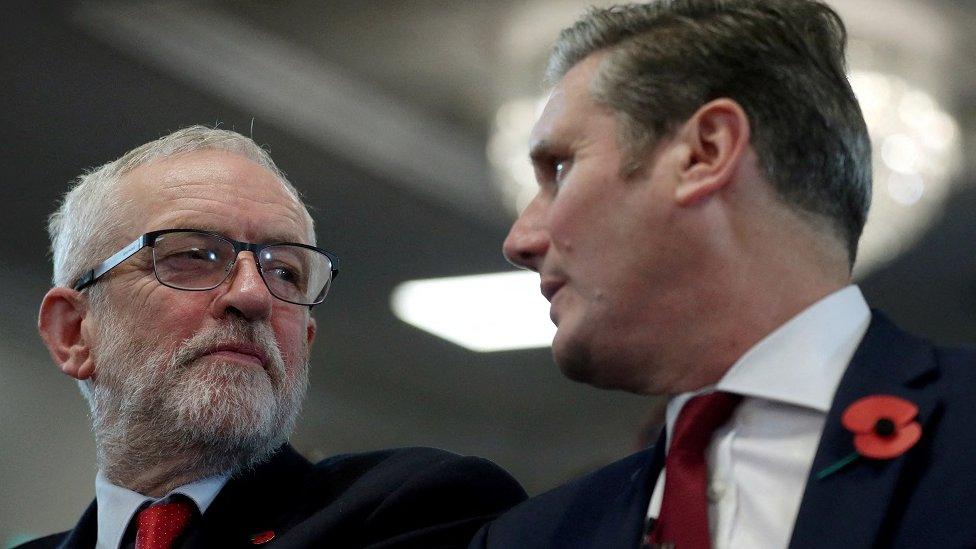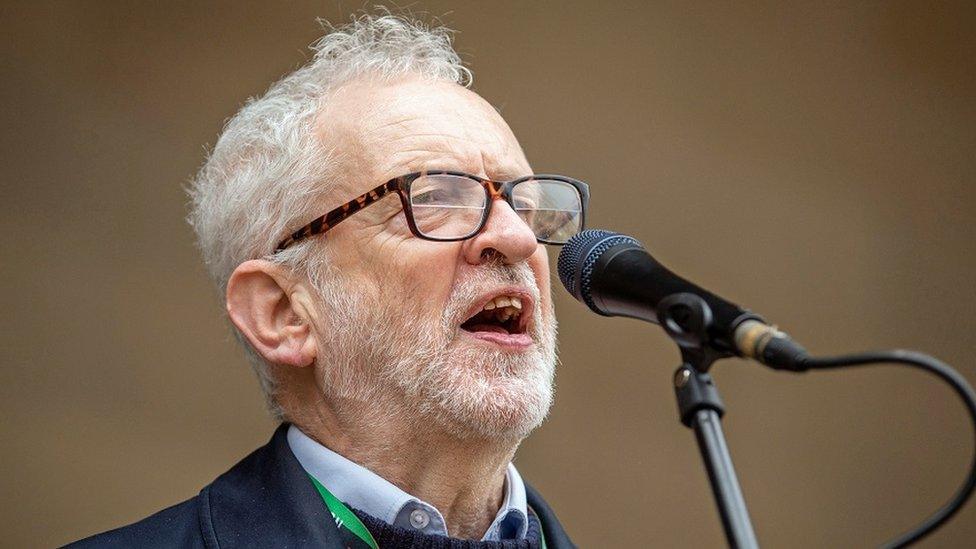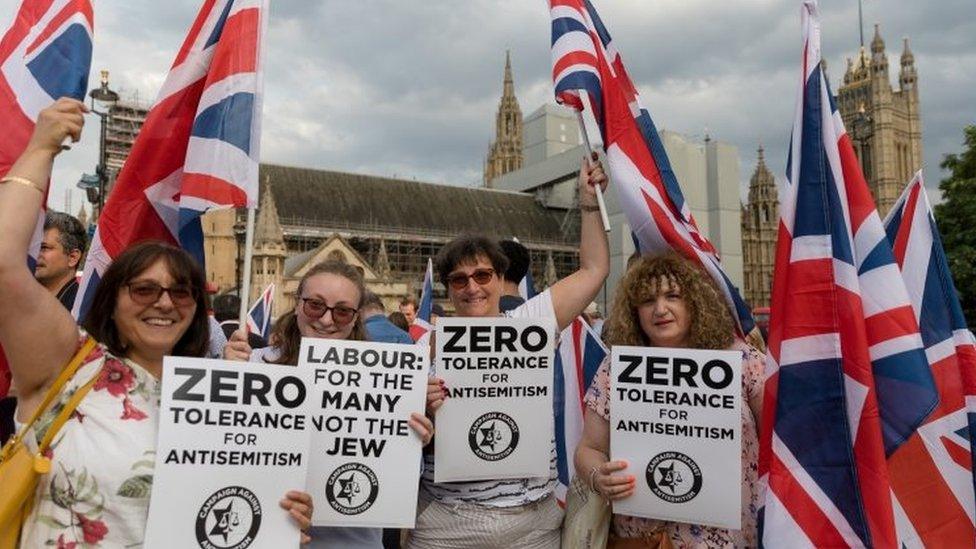Jeremy Corbyn banned from standing as candidate for Labour party
- Published

Labour's governing body has voted to block Jeremy Corbyn from standing as a Labour candidate at the next election.
The National Executive Committee (NEC) voted 22 to 12 to approve a motion from Sir Keir Starmer to prevent Labour endorsing Mr Corbyn. There is no right of appeal.
Mr Corbyn is suspended from being a Labour MP and sits as an independent following a row over antisemitism.
The former Labour leader called it a "shameful attack on party democracy".
In a statement, he said the decision to block him showed "contempt" for the voters who had supported the party at the 2017 and 2019 elections.
And in a hint he could run as an independent candidate in the constituency he has represented since 1983, he said he had "no intention" to stop "fighting for a fairer society on behalf of the people of Islington North".
Mr Corbyn criticised the Labour leader, claiming Sir Keir "has instead launched an assault on the rights of his own Labour members, breaking his pledge to build a united and democratic party".
'End NEC impositions'
Last month, Sir Keir announced that Mr Corbyn would not be a Labour candidate, confirming months of speculation.
The motion approved by the NEC states that allowing Mr Corbyn to stand would "significantly diminish" Labour's chances of "winning the next general election".
"It is is not in the best interests of the Labour Party for it to endorse Mr Corbyn as a Labour Party candidate at the next general election," the text of the motion says.
The NEC has the power to endorse, or not endorse, a candidate selected for election.

From 2016, Sir Keir was a key member of Mr Corbyn's shadow cabinet, speaking for the party on Brexit.
Mr Corbyn led Labour to defeat in the 2017 and 2019 general elections but remains a popular figure with many on the left of the party.
But Sir Keir suspended him as a Labour MP in 2020 after he said the scale of antisemitism within Labour had been "dramatically overstated" by his opponents, in response to a highly critical report by the Equality and Human Rights Commission (EHRC) into the party's handling of complaints under his leadership.
The NEC readmitted Mr Corbyn to the Labour Party as a member in November 2020 - but he is blocked from representing the party in Parliament.
The Islington North Constituency Labour Party said it "rejects the NEC's undue interference" in who it chooses as an MP.
The NEC vote "undermines our goal of defeating the Conservatives and working with our communities for social justice," the group said in a statement.
"We believe in the democratic right of all constituency parties to choose their prospective parliamentary candidate."
While running for leader of the Labour party, Sir Keir had said Labour "should end NEC impositions of candidates" on local associations, tweeting that local party members should select their candidates for every election.
Jon Lansman, the co-founder of the Corbyn-backing Momentum campaign group, accused Sir Keir of acting like an "authoritarian".
"Keir Starmer unfortunately is behaving as if he was some kind of Putin of the Labour Party. That is not the way we do politics," he told Times Radio.
However Labour's national campaign coordinator Shabana Mahmood defended the decision, saying it had "always been the case" that the NEC endorses candidates.
She said Mr Corbyn had failed to take "responsibility" for the EHRC report in 2020, and Sir Keir had made the "changes that are needed".
Antisemitism row
The EHRC launched its inquiry in May 2019, after receiving complaints about antisemitism within the party.
It found Labour had breached the Equality Act by failing to provide adequate training for staff dealing with allegations, and because of "political interference" from Mr Corbyn's office in the handling of those complaints.
Labour was ordered to draw up a plan to improve its complaints process, which it did in December 2020.
This committed the party to setting up an independent process to handle complaints, putting together a handbook for staff handling complaints, and improving training.
In February, EHRC chief executive Marcial Boo said the watchdog was now "content with the actions taken" by the party after winding up a two-year monitoring process at the end of January.
Related topics
- Published27 March 2023

- Published18 November 2020
